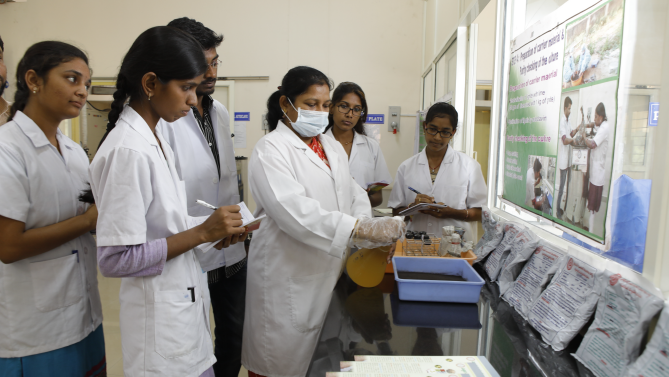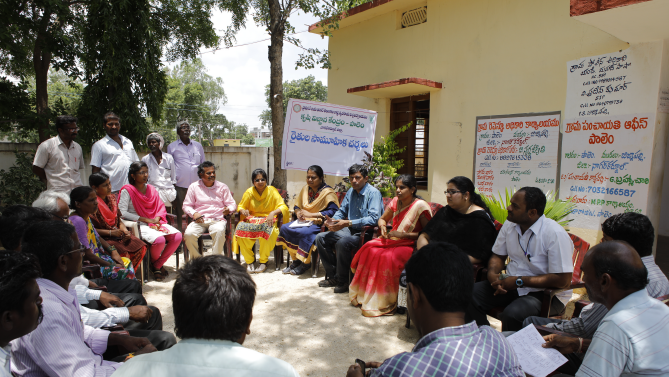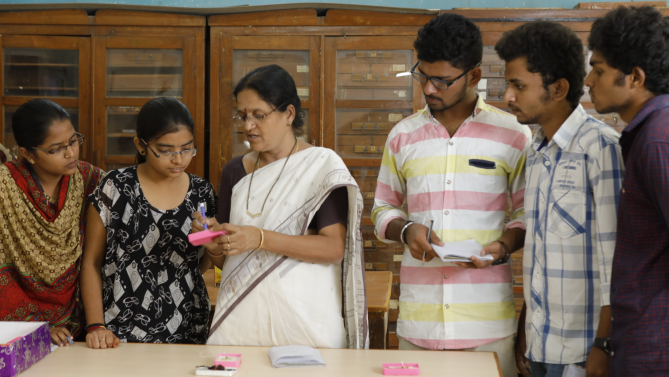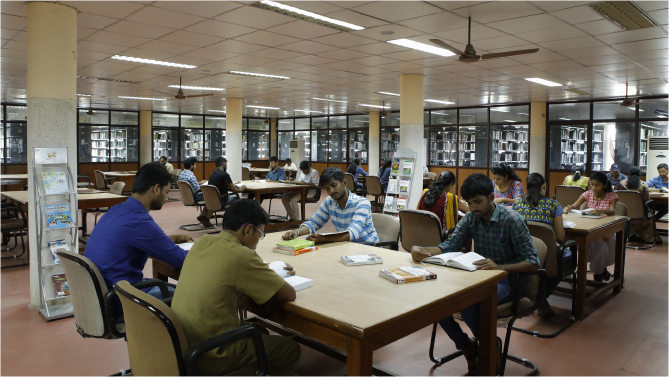Education
Igniting young minds to be torchbearers of a better tomorrow
Research
Developing technologies that lead to crop improvement and sustainable agri development
Extension
Facilitating transferring of knowledge and innovative technologies to the ground for the benefit of all
Top Notch Facilities at PJTAU
Quality Control Lab
The MFPI – Quality Control Laboratory is an advanced, accredited research facility of the University delivering end to end food testing solutions of raw and processed food commodities.
TAFE Centre
This centre at PJTAU is a PPP model established in partnership with TAFE. It is established for creating awareness on farm mechanisation and smart irrigation technology among the students, farmers and other stakeholders.
Pesticide Residue Lab
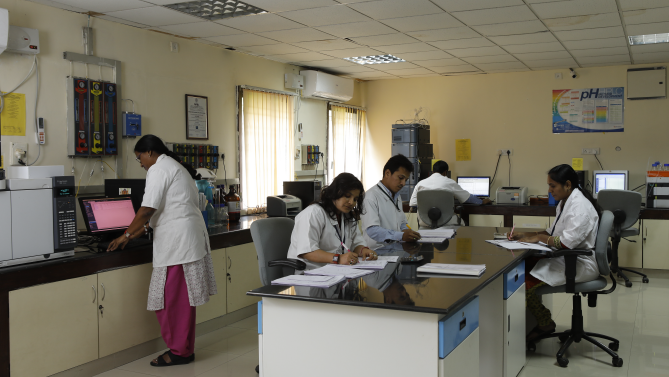
Tests and monitors pesticide residues in various food commodities for promoting safe use of pesticides.
Biological Control Lab

Nodal agency for all state bio-control laboratories to provide inoculums cultures of bio-agents and quality assurance of bio pesticides.
Water Technology Centre

Nodal agency for programme planning, policy making and water related issues.
Seed Research & Technology Centre

Nodal centre for breeder seed production of crops for perpetuation in seed chain and research on seed health.
Agro Climate Research Centre
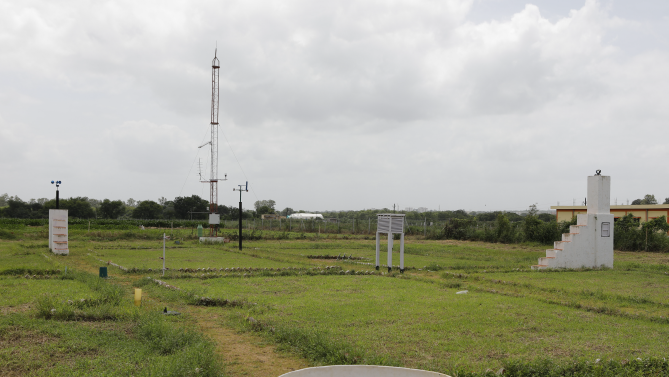
Formulates and implements climate mitigation strategies to minimize the impact of climate change.
Millet Processing Incubation Centre

Pioneers in research, commercialization and entrepreneurship development of millet value added products.
Farm Machinery Testing Centre

The Farm Machinery Testing Center is running under the Farm Implements and Machinery Scheme. This Center is one of the FMTCs approved by the Department of Agriculture & Co-operation, Ministry of Agriculture and Farmers’ Welfare, Government of India in the direction of ensuring supply of quality agricultural machinery and equipment to the farmers.
Remote Sensing & GIS Lab

New Remote Sensing & Geographic Information System (RS & GIS) laboratory established in collaboration with National Remote Sensing Center (NRSC), Hyderabad at Water Technology Centre, Rajendra Nagar for geospatial technology utilization for agriculture and to support student research projects of the University.
Institute of Biotechnology

An institute for human resource development and capacity building in the frontier areas of molecular biology and biotechnology and improvement of agricultural crops through molecular breeding, transgenic and genomic approaches.
Central Instrumentation Cell
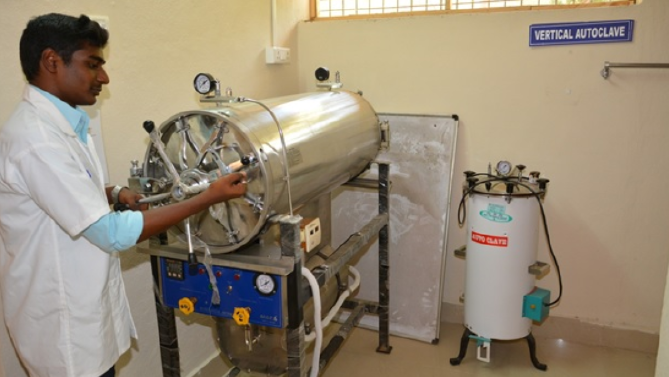
The University has been acknowledged across the country as the pioneering institute in implementation of novel Rural Agricultural Work Experience Programme and Agricultural Experiential learning Programme standardising the units across campuses in all the faculties.
Precision Farming Development Centre

The mandate of PFDC is to generate location-specific technologies for efficient use and management of water resources on a sustainable basis.
Vertebrate Pest Management Centre

Premier Centre for developing eco friendly and cost effective technology for wild animal and bird management
Nature Dyes Processing and Incubation Centre

A centre for large scale production of natural dyes.
AELP Centres
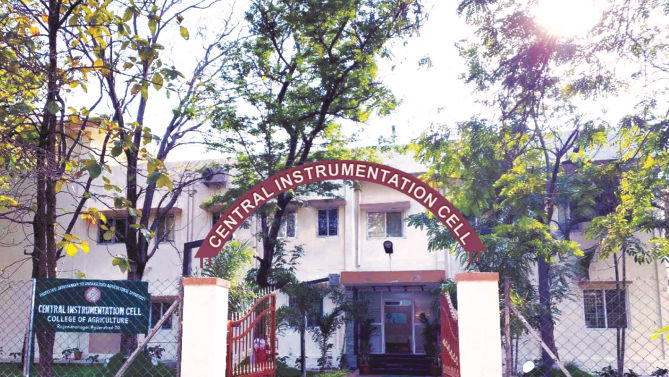
Agricultural Experiential Learning Program To shape up into service focused entrepreneurs.
Textile Apparel Unit

Department of Apparel and Textiles is one of the major disciplines of Community Science at PJTAU, catering to a vast majority of customers and working in the aspects of textile and surface designing, commercialisation of technology, production of functional clothing, etc.
Top Notch Facilities at PJTSAU
Quality Control Lab

The MFPI – Quality Control Laboratory is an advanced, accredited research facility of the University delivering end to end food testing solutions of raw and processed food commodities.
TAFE Centre
This centre at PJTSAU is a PPP model established in partnership with TAFE. It is established for creating awareness on farm mechanisation and smart irrigation technology among the students, farmers and other stakeholders.
Pesticide Residue Lab

Tests and monitors pesticide residues in various food commodities for promoting safe use of pesticides.
Biological Control Lab

Nodal agency for all state bio-control laboratories to provide inoculums cultures of bio-agents and quality assurance of bio pesticides.
Water Technology Centre

Nodal agency for programme planning, policy making and water related issues.
Seed Research & Technology Centre

Nodal centre for breeder seed production of crops for perpetuation in seed chain and research on seed health.
Agro Climate Research Centre

Formulates and implements climate mitigation strategies to minimize the impact of climate change.
Millet Processing Incubation Centre

Pioneers in research, commercialization and entrepreneurship development of millet value added products.
Farm Machinery Testing Centre

The Farm Machinery Testing Center is running under the Farm Implements and Machinery Scheme. This Center is one of the FMTCs approved by the Department of Agriculture & Co-operation, Ministry of Agriculture and Farmers’ Welfare, Government of India in the direction of ensuring supply of quality agricultural machinery and equipment to the farmers.
Remote Sensing & GIS Lab

New Remote Sensing & Geographic Information System (RS & GIS) laboratory established in collaboration with National Remote Sensing Center (NRSC), Hyderabad at Water Technology Centre, Rajendra Nagar for geospatial technology utilization for agriculture and to support student research projects of the University.
Institute of Biotechnology

An institute for human resource development and capacity building in the frontier areas of molecular biology and biotechnology and improvement of agricultural crops through molecular breeding, transgenic and genomic approaches.
Central Instrumentation Cell

The University has been acknowledged across the country as the pioneering institute in implementation of novel Rural Agricultural Work Experience Programme and Agricultural Experiential learning Programme standardising the units across campuses in all the faculties.
Precision Farming Development Centre

The mandate of PFDC is to generate location-specific technologies for efficient use and management of water resources on a sustainable basis.
Vertebrate Pest Management Centre

Premier Centre for developing eco friendly and cost effective technology for wild animal and bird management
Nature Dyes Processing and Incubation Centre

A centre for large scale production of natural dyes.
AELP Centres

Agricultural Experiential Learning Program To shape up into service focused entrepreneurs.
Textile Apparel Unit

Department of Apparel and Textiles is one of the major disciplines of Community Science at PJTSAU, catering to a vast majority of customers and working in the aspects of textile and surface designing, commercialisation of technology, production of functional clothing, etc.
Research
Research is led by experienced and trained scientific community who are conducting basic and action research through the funded projects of Indian Council of Agricultural Research (ICAR), Department of Biotechnology (DBT), Department of Science & Technology (DST), Government of India (GoI) and Rashtriya Krishi Vikas Yojana (RKVY). The research experiments are prioritized based on the immediate, short-term, long-term location specific needs of the farmers of the various agro climatic zones.
Crop Varieties / Hybrids
The University focuses on developing high yielding varieties in the major crops of the State to enhance farm productivity and farmers income. Crop varieties / hybrids suitable for the State and in some cases in the neighboring states and country wide have been released. In the years 2015-16, 2019-20 and 2020-21 PJTSAU released 13, 14 and 3 totaling to 30 crop varieties. Further, during 2021-22 Five Rice Varieties (Rajendranagar Vari-2, Kunaram Vari-2, Warangal Vari-2, Kampasagar Vari-1, Rajendranagar Vari-1), two Sorghum Varieties (Palem Jonna-1, Tandur Jonna-1), Red gram (Warangal Kandi-2), Green gram (Madhira Pesara-1), Sesame (Jagtiala til-2), Soybean (Adilabad Indore Soyachikkudu-1) were released.
Agro-Technologies
The University has developed several customized agro-techniques which augment their potential performance leading to reduced cost of cultivation and higher remuneration to the farmers. Research contingent through their concerted efforts brought out several field implementable technologies in the area of natural resource management (NRM) and Crop production (52), plant protection (26) and farm mechanization (7). These technologies are intended for adoption by the farming community in all the three agro climatic zones of the state.
Innovative Projects
PJTSAU has reoriented its research from production to full value chain development for enabling optimum utilization of resources and maximizing profits for the farmers. Several initiatives to diversify the agricultural landscape in view of the changed irrigation potential in the State are being validated on field. University initiated ten projects to carry out research in the specified areas and locations with collaborating institutes. PJTSAU has established pilot units for value addition in oilseeds, pulses and cereals for commercialization and entrepreneurship development of the value added products. In addition, the University established a state of art Central Instrumentation Cell (CIC) to facilitate research in niche areas by the students and faculty. Remote sensing and GIS lab was started for capacity building and research on application of geospatial technology for agriculture development.
Research
Research is led by experienced and trained scientific community who are conducting basic and action research through the funded projects of Indian Council of Agricultural Research (ICAR), Department of Biotechnology (DBT), Department of Science & Technology (DST), Government of India (GoI) and Rashtriya Krishi Vikas Yojana (RKVY). The research experiments are prioritized based on the immediate, short-term, long-term location specific needs of the farmers of the various agro climatic zones.
Crop Varieties / Hybrids
The University focuses on developing high yielding varieties in the major crops of the State to enhance farm productivity and farmers income. Crop varieties / hybrids suitable for the State and in some cases in the neighboring states and country wide have been released. In the years 2015-16, 2019-20 and 2020-21 PJTSAU released 13, 14 and 3 totaling to 30 crop varieties. Further, during 2021-22 Five Rice Varieties (Rajendranagar Vari-2, Kunaram Vari-2, Warangal Vari-2, Kampasagar Vari-1, Rajendranagar Vari-1), two Sorghum Varieties (Palem Jonna-1, Tandur Jonna-1), Red gram (Warangal Kandi-2), Green gram (Madhira Pesara-1), Sesame (Jagtiala til-2), Soybean (Adilabad Indore Soyachikkudu-1) were released.
Agro-Technologies
The University has developed several customized agro-techniques which augment their potential performance leading to reduced cost of cultivation and higher remuneration to the farmers. Research contingent through their concerted efforts brought out several field implementable technologies in the area of natural resource management (NRM) and Crop production (52), plant protection (26) and farm mechanization (7). These technologies are intended for adoption by the farming community in all the three agro climatic zones of the state.
Innovative Projects
PJTSAU has reoriented its research from production to full value chain development for enabling optimum utilization of resources and maximizing profits for the farmers. Several initiatives to diversify the agricultural landscape in view of the changed irrigation potential in the State are being validated on field. University initiated ten projects to carry out research in the specified areas and locations with collaborating institutes. PJTSAU has established pilot units for value addition in oilseeds, pulses and cereals for commercialization and entrepreneurship development of the value added products. In addition, the University established a state of art Central Instrumentation Cell (CIC) to facilitate research in niche areas by the students and faculty. Remote sensing and GIS lab was started for capacity building and research on application of geospatial technology for agriculture development.
Extension
The outreach activities of the University are carried out by specialized extension centres including nine District Agricultural Advisory and Transfer of Technology Centres (DAATTCs) and 10 Krishi Vigyan Kendras (KVKs) spread across the State. The extension wing builds bridges between the research wing, developmental departments of the Government and the end users including the farmers providing the necessary information on modern agricultural technologies.
District Agricultural Advisory and Transfer of Technology Centres (DAATTC’s)
The DAATTC’s located in the erstwhile nine districts of Telangana were relocated in view of the reorganization of the districts in the State to address the information and technology transfer needs of the farmers of the newly formed districts w.e.f 21st April 2020.
Krishi Vigyan Kendras (KVK’s)
The KVK’s under the jurisdiction of the University are grass root level extension centres devoted to educate farmers, farm women and rural youth on farm technologies with an aim to better their livelihood security through short long term training programmes. These centres conduct Technology Assessment and Refinement (TAR) and Front Line Demonstrations under farmer’s field condition and also demonstrate the latest technological developments to the farmers on instructional farms.
Agricultural Technology Information Centre (ATIC)
Agricultural Technology Information Centre (ATIC) was established to disseminate agricultural information and provide technology products to the farmers. The ATIC centre successfully delivered the technologies and the details of the availability of products to the farmers of the State. The centre also successfully provided a management system between the farmers and scientific fraternity.
Agricultural Information and Communication Centre (AI&CC)
The AI&CC and PJTSAU Press are responsible for processing of latest agricultural information generated by the University and transferring to the end users in the State through print media.
Electronic Wing
The Electronic Wing of the University provides need based visuals as well as technical support like content generation, script writing, identification of resource persons for phone-in-live programmes, etc. on agriculture and allied subjects along with farmer success stories as and when required by the electronic media.
Extension Education Institute (EEI)
The Extension Education Institute (EEI) at Rajendranagar is a premier regional training institute financed by the Ministry of Agriculture (Dept. of Agriculture and Cooperation), Govt. of India, New Delhi and caters to the training needs of the middle level extension functionaries of development departments of Telangana, Andhra Pradesh, Tamil Nadu, Karnataka, Odisha, Union Territories of Andaman and Nicobar Islands, Pondicherry and Lakshadweep. It organizes on-campus and off-campus training programmes on extension management, extension methodologies, technology and sensitization.
Extension
The outreach activities of the University are carried out by specialized extension centres including nine District Agricultural Advisory and Transfer of Technology Centres (DAATTCs) and 10 Krishi Vigyan Kendras (KVKs) spread across the State. The extension wing builds bridges between the research wing, developmental departments of the Government and the end users including the farmers providing the necessary information on modern agricultural technologies.
District Agricultural Advisory and Transfer of Technology Centres (DAATTC’s)
The DAATTC’s located in the erstwhile nine districts of Telangana were relocated in view of the reorganization of the districts in the State to address the information and technology transfer needs of the farmers of the newly formed districts w.e.f 21st April 2020.
Krishi Vigyan Kendras (KVK’s)
The KVK’s under the jurisdiction of the University are grass root level extension centres devoted to educate farmers, farm women and rural youth on farm technologies with an aim to better their livelihood security through short long term training programmes. These centres conduct Technology Assessment and Refinement (TAR) and Front Line Demonstrations under farmer’s field condition and also demonstrate the latest technological developments to the farmers on instructional farms.
Agricultural Technology Information Centre (ATIC)
Agricultural Technology Information Centre (ATIC) was established to disseminate agricultural information and provide technology products to the farmers. The ATIC centre successfully delivered the technologies and the details of the availability of products to the farmers of the State. The centre also successfully provided a management system between the farmers and scientific fraternity.
Agricultural Information and Communication Centre (AI&CC)
The AI&CC and PJTSAU Press are responsible for processing of latest agricultural information generated by the University and transferring to the end users in the State through print media.
Electronic Wing
The Electronic Wing of the University provides need based visuals as well as technical support like content generation, script writing, identification of resource persons for phone-in-live programmes, etc. on agriculture and allied subjects along with farmer success stories as and when required by the electronic media.
Extension Education Institute (EEI)
The Extension Education Institute (EEI) at Rajendranagar is a premier regional training institute financed by the Ministry of Agriculture (Dept. of Agriculture and Cooperation), Govt. of India, New Delhi and caters to the training needs of the middle level extension functionaries of development departments of Telangana, Andhra Pradesh, Tamil Nadu, Karnataka, Odisha, Union Territories of Andaman and Nicobar Islands, Pondicherry and Lakshadweep. It organizes on-campus and off-campus training programmes on extension management, extension methodologies, technology and sensitization.
Academia
The University offers diploma, undergraduate and postgraduate programmes including doctoral programmes in the faculties of Agriculture, Agricultural Engineering & Technology and Community Science. A total of six Agricultural Colleges, ten Agriculture Polytechnics and one Seed Technology Polytechnic are under the Faculty of Agriculture; One College of Agricultural Engineering, one College of Food Science & Technology. One Agricultural Engineering Polytechnic are under the Faculty of Agricultural Engineering & Technology and one College of Community Science is under the Faculty of Community Science.
Courses offered
PJTSAU offers four UG, nineteen PG and fifteen Doctoral Degree Programmes across the faculties of Agriculture, Agricultural Engineering & Technology and Community Science.
Student’s admission and outturn
Total number of students admitted across the faculties and degree programmes during the academic years 2014-15 to 2020-21 is 12796 with an outturn of 10142. Students provided employment through placement cells is 1215.
Human Resource Growth:
At the time of establishment of the University, the sanctioned strength in various cadres was 608 and which was increased up to 778 with the sanction appointment of teaching posts for colleges. The recruitment of 179 faculty in the Assistant Professor cadre was taken up during the year 2018. The regular teaching staff strength of the University stands at 508.
Faculty Student Ratio
The faculty student ratio improved to 1:5 with the recruitment of faculty.
Participation of faculty and students in overseas programmes
One hundred and two (102) faculty and seven students visited foreign countries to participate in conferences, seminars, workshops or to complete part of their thesis work from 2014-15 to 2020-21.
Awards for the University
Since the formation of PJTSAU, faculty, students and institutions were bestowed with 117 prestigious national and international awards for the contributions made in teaching, research and extension.
Academia
The University offers diploma, undergraduate and postgraduate programmes including doctoral programmes in the faculties of Agriculture, Agricultural Engineering & Technology and Community Science. A total of six Agricultural Colleges, ten Agriculture Polytechnics and one Seed Technology Polytechnic are under the Faculty of Agriculture; One College of Agricultural Engineering, one College of Food Science & Technology. One Agricultural Engineering Polytechnic are under the Faculty of Agricultural Engineering & Technology and one College of Community Science is under the Faculty of Community Science.
Courses offered
PJTSAU offers four UG, nineteen PG and fifteen Doctoral Degree Programmes across the faculties of Agriculture, Agricultural Engineering & Technology and Community Science.
Student’s admission and outturn
Total number of students admitted across the faculties and degree programmes during the academic years 2014-15 to 2020-21 is 12796 with an outturn of 10142. Students provided employment through placement cells is 1215.
Human Resource Growth:
At the time of establishment of the University, the sanctioned strength in various cadres was 608 and which was increased up to 778 with the sanction appointment of teaching posts for colleges. The recruitment of 179 faculty in the Assistant Professor cadre was taken up during the year 2018. The regular teaching staff strength of the University stands at 508.
Faculty Student Ratio
The faculty student ratio improved to 1:5 with the recruitment of faculty.
Participation of faculty and students in overseas programmes
One hundred and two (102) faculty and seven students visited foreign countries to participate in conferences, seminars, workshops or to complete part of their thesis work from 2014-15 to 2020-21.
Awards for the University










